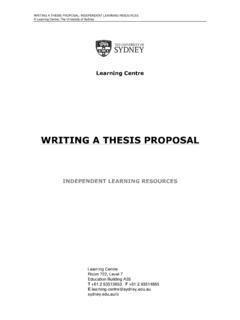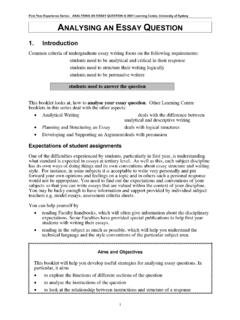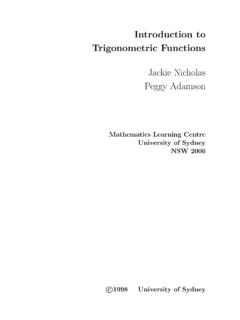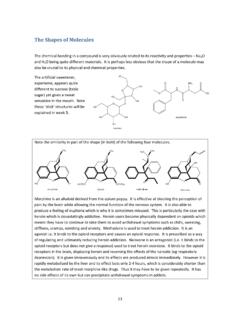Transcription of The Addenbrooke’s Cognitive Examination-III Frequently ...
1 Updated 01/12/2019 The Addenbrooke s Cognitive Examination-III Frequently asked Questions Who is the ACE-III intended for? The ACE-III is a Cognitive screening tool recommended for use by health practitioners and researchers in patients over 50 years old with suspected dementia. Where can I obtain the ACE-III? The ACE-III scoring and administration guidelines can be obtained at the following website: Is the ACE-III free and who owns the copyright? The ACE-III is available for free. The copyright is held by Professor John Hodges who is happy for the test to be used in clinical practice and research projects.
2 There is no need to contact us if you wish to use the ACE-III in clinical practice. We are interested to hear about research projects involving the instrument. Why were changes made to the ACE-R? The ACE-R was modified as a result of an extensive exchange with PAR, the publishers of the MMSE, following contact from PAR concerning the use of the ACE-R. Items that were specific from the MMSE were removed or replaced to the satisfaction of PAR. The ACE-R has now been withdrawn. The ACE-III is still scored out of 100 with 5 domain scores. The main changes are within the Language and Visuospatial Domains.
3 For example, the three-stage-command has been replaced by a short graded test of grammatical comprehension and the overlapping pentagons have been replaced by another drawing. Can I derive the MMSE score from the ACE-III? No, for the reasons outlined above. Has the ACE-III been validated and published? Yes, the validation study on the ACE-III is published in Dementia and Geriatric Cognitive Disorders [1]. In summary, total scores on the ACE-III are highly correlated to the ACE-R with similar sensitivity and specificity values for the same cut offs (88/100 or 82/100). Cognitive domains within the ACE-III have been validated against a battery of standardized neuropsychological tests, with high levels of correlation between the domain scores and targeted tests.
4 What are the cut-offs for the ACE-III? The same cut-off scores (88 and 82 out of 100) for a suspicion of dementia is recommended. The cut-off that is used depends on the purpose the ACE-III is being used for ( in a clinical or a research setting) and the sensitivity and specificity required. How many times can I administer the ACE-III? The ACE-III is recommended for review assessments of 6 months or more. It is suggested that an alternate version of the ACE-III is used at each visit ( version A, B, or C). These versions vary in the name and address used in the Memory section to avoid patients learning this over repeat administrations.
5 Can I derive the VLOM ratio on the ACE-III? The VLOM ratio was developed on the original ACE [2] and relies on the domains of Verbal Fluency, Language, Orientation and Memory. The ACE-III now contains different items to the original ACE and the VLOM ratio derived from the ACE-III has not been validated. We tend not to use the VLOM in a clinical setting. Updated 01/12/2019 Is there normative data? Yes. The sample size, however, is relatively small at this stage, so we are currently working in expanding the age groups and educational levels. Here are our normative data available for the ACE-III and the M-ACE.
6 ACE-III This sample comprises 53 controls with mean age and mean education Attention/ Orientation Memory Verbal Fluency Language Visuospatial ACE-III Total Controls ( ) ( ) ( ) ( ) ( ) ( ) 95% CI M-ACE This sample comprises 109 controls with mean age and mean education Total Sample Age <65 Age >65 Education <12y Education >12y N 109 34 73 33 73 Total M-ACE ( ) ( ) ( ) ( ) ( ) 95% CI Is the ACE-III being translated into other languages? A number of colleagues are currently translating and validating the ACE-III.
7 As they become available, we will put them on our website. If you are interested in validating the ACE-III in your language, please contact Angela Scharfenberg . Is there a training video for administration of the ACE-III? An online training programme for the administration and scoring of the ACE-III has been developed by Professor Jonathan Evans, Dr Leigh Whitnall and Dr Stephanie Crawford at the University of Glasgow in conjunction with NHS Education for Scotland. To access the programme go to: On the login page, click on Register. Is there an iPad version of the ACE-III?
8 An iPad compatible app (ACEM obile) has been developed in collaboration with the University of Plymouth and Derriford Hospital (Drs Rupert Noad and Craig Newman). For more information, please visit Is there a short version of the ACEIII? The Mini-Addenbrooke s Cognitive Examination was developed from a data-driven approach and has been validated in a large cohort of dementia patients [3]. It is scored out of 30. Two cut-offs have been recommended: 25 and 21. The M-ACE is free for download on the Frontier test download website. M-ACE scores can also be derived from the full version of the ACE-III.
9 What if I have more questions? If you have more questions, please email Angela Scharfenberg Updated 01/12/2019 References 1. Hsieh, S., Schubert, S., Hoon, C., Mioshi, E., and Hodges, , Validation of the Addenbrooke's Cognitive Examination III in frontotemporal dementia and Alzheimer's disease. Dement Geriatr Cogn Disord 2013; 36: 242-250. 2. Mathuranath, , Nestor, , Berrios, , Rakowicz, W., and Hodges, , A brief Cognitive test battery to differentiate Alzheimer's disease and frontotemporal dementia. Neurology 2000; 55: 1613-1620. 3. Hsieh, S., McGrory, S., Leslie, F., et al.
10 , The Mini-Addenbrooke's Cognitive Examination: A new assessment tool for dementia. Dement Geriatr Cogn Disord 2014; 39: 1-11.













